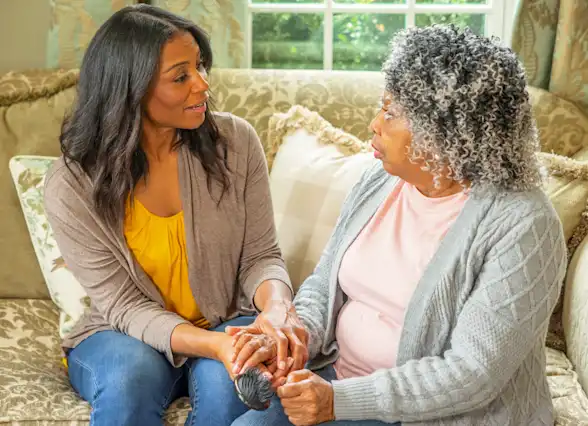Take Care of Yourself and Prepare Yourself, Crucial Conversations
Have crucial conversations about future planning, including difficult subjects like disability and death.
Get insurance benefits, legal documents, and medical records in one place

Helpful Highlights
This segment is part of our larger Guide, Take Care of Yourself and Prepare Yourself, the Art of Anticipation.
This is one of five points made in the larger Guide and specific to approaching conversations about what your loved one wants in the future.
Gaining a deeper insight into your loved one’s needs, wants, and expectations must include a discussion about end-of-life issues. Even those who have “lived a good life” and don’t fear death may have trouble talking about it. You may have trouble talking about it, as well. But finding a way to approach it is necessary, and oftentimes approaching it just very matter of factly is best. Anticipate decisions that need to be made in the event of disability or dying/death and start making as many as are reasonable now.
There are professionals available for consultation who can introduce the topics that should be covered and moderate the discussion, such as elder attorneys and certified life planners or senior advisors. Your loved one’s healthcare team can also help with some of it.
Should your loved one become incapacitated, who do they want to make decisions for them? (Power of Attorney)
In the event of a major health crisis, what treatments do they want? Which don’t they want? Do they want resuscitation, ventilatory support, tube or IV feedings? (Advanced Directives or Living Will)
Should your loved one become physically and/or mentally disabled, what kind of help do they want, and when? Do they want in-home care - intermittent or 24/ 7? Do they want to move to a facility? Do they want to move in with you?
In the event of a life-limiting condition, are they interested in palliative care? Are they interested in hospice care?
Upon death, what are their preferences? Who do they want to handle their final disposition (likely a church or mortuary)? Do they want to be buried? Where? Do they want to be cremated? What do they want done with the ashes? Do they want a funeral service? Do they want to consider making and paying for these arrangements now? (Advance Planning)
Upon death, what do they want to do with their home, money, assets, and belongings? (Last Will)
No content in this app, regardless of date, should ever be used as a substitute for direct medical advice from your doctor or other qualified clinician; or any direct legal advice you receive from your lawyer or other qualified legal professionals; or direct advice from a licensed insurance broker or other qualified plan-payer professional.
Get more support and guidance on insurance benefits, medical records and legal forms.
Helpful brings together your insurance benefits, legal documents, and medical records in one personalized place — so you always know what you have, and never have to search again.

Technology for Health Tasks. Mental Health for the Tough Stuff.
Helpful connects your medical records, insurance, and caregiving tasks automatically. And when you need more than logistics, a therapist is here to guide you.
In-Network and Covered
For Individuals, Couples and Families
HIPAA Compliant, Data Stays Private


Healthcare Tasks Simplified

From syncing records to spotting drug interactions, Helpful does the heavy lifting, turning complex health info into clear tasks and showing you benefits you can actually use, giving you clarity and control over your care.

In-Network Mental Health

Our licensed therapists are here to support you and your loved ones through stress, burnout, and life’s hardest moments, with an inclusive, compassionate approach that works with most insurance plans.

Create Legal Documents

Plan ahead by creating will, trusts, advance directives and more, that ensure your wishes are honored in the event you can’t speak for yourself -with Helpful guiding you every step of the way.